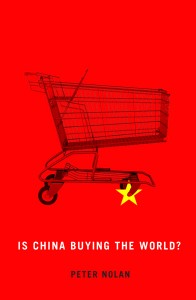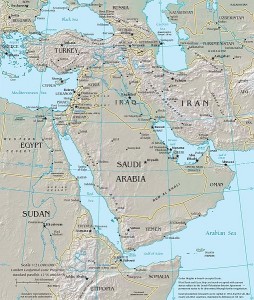Is China Really a Threat?
March 11th, 2013 // 1:01 pm @ Oliver DeMille
 I try to read most new books on China, because I think the growth of China on the world stage will continue for some time and eventually conflict with America’s interests.
I try to read most new books on China, because I think the growth of China on the world stage will continue for some time and eventually conflict with America’s interests.
Whether the conflict turns to cooperation or serious difficulty remains to be seen, but keeping abreast of what is happening in China is essential for today’s leaders.
A new book, Is China Buying the World? by Peter Nolan, is an interesting addition to the field and adds several key ideas to the dialogue.
First, it makes the case that no, China is not buying the world any more than Japan bought it in the 1980s (despite widespread fears that this was occurring).
Second, however, China is certainly growing economically and in world influence.
Chinese firms have purchased ownership in a number of companies around the advanced world, as well as tying up access to a lot of natural resources in the developing world.
And numerous multi-national companies have heavily invested in China.
This growth will likely continue, and even expand.
Third, China’s major challenge is restricted access to oil and energy.
As it grows, its thirst for energy will continue to increase and drive its international business expansion.
Fourth, China wants to be a much bigger player on the world scene, and it is following a specific strategy for global influence.
This strategy includes major investments in two key sectors of the world economy, banking and the aerospace industry.
Chinese leaders hope that together, these things—increased investment in the developing world, increased ownership of international resources especially oil, growing global investment in China, increased ownership in multi-national companies, major growth of Chinese influence in the banking and aerospace sectors—will significantly strengthen China’s world role.
Fifth, advances in the aerospace industry are significant because of the close ties between military and business technologies and projects.
As China increases its role in this endeavor, along with banking, it becomes more powerful economically, technologically and, if it chooses, militarily.
This book is a detailed and important read for anyone who cares about the future of the big powers in world relations.
More to the point, more people need to read and think more about the specific issues currently at play in China’s growth.
***********************************
 Oliver DeMille is the chairman of the Center for Social Leadership and co-creator of Thomas Jefferson Education.
Oliver DeMille is the chairman of the Center for Social Leadership and co-creator of Thomas Jefferson Education.
He is the author of A Thomas Jefferson Education: Teaching a Generation of Leaders for the 21st Century, and The Coming Aristocracy: Education & the Future of Freedom.
Oliver is dedicated to promoting freedom through leadership education. He and his wife Rachel are raising their eight children in Cedar City, Utah.
Category : Blog &Book Reviews &Business &Current Events &Economics &Featured &Foreign Affairs
China v. Japan
March 1st, 2013 // 10:18 am @ Oliver DeMille
Interesting commentary with visuals:
Category : Blog &Current Events &Economics &Foreign Affairs
3 New Thoughts on China’s Emergence as a Superpower
September 6th, 2012 // 2:19 pm @ Oliver DeMille
There is a lot of recent chatter about China, even though Iran is the big topic in international affairs.
Recent articles and books on China mostly center around one of two themes.
One side argues that China is a serious and growing threat, the other that China is misunderstood and Washington should do more to cooperate with Beijing.
A third, more relevant, argument is needed, and it goes something like this: China isn’t the problem, Washington is!
Three Trends
Consider the following three trends:
1-Many China experts in the West criticize China because it is becoming a superpower without showing much likelihood of getting involved in world leadership.
But this is actually a normal historical pattern. New superpowers benefit because the older superpowers are overextended around the globe trying to “exert leadership” in every part of the earth.
For example, Britain’s overreach made it simple for the U.S. to become a superpower, just as Spain’s overextension did the same for Britain. Rome did the same thing. Critics say that it was Hitler who weakened the UK, but imagine how strong London would have been if it had stopped trying to police the world for the decades before Hitler and had instead built its wealth and strength. Hitler may well have declined to spread across Europe in the face of such power.
One would think that an old superpower in a battle with a rising new threat would be smart enough to reduce its global overreach and return to the things that once made it competitive. But, historically, logic seldom reigns in superpower decline.
2-China is currently involved in aggressive currency competition. It seems to want the U.S. currency to be weakened, and for the U.S. credit rating to be downgraded again. It is also pushing for the dollar to lose its world reserve currency status (which allows Washington to print money at will without metal backing).
When this same thing occurred to Britain in the 1970s, the British economy was deeply hurt and still hasn’t fully recovered. In fact, the average net worth of most people in the UK was decreased by more than 30% overnight when this happened.
Such a circumstance in the current U.S. would be a major boost for Chinese power in the world, and the American economy is presently vulnerable. The natural consequence of such a development would likely come in two stages. First, a new reserve currency would be an IMF or other international tender backed by currencies from several top nations including the U.S., EU and China. Second, eventually China’s currency would be adopted as the world reserve.
This is not a far-fetched possibility. As mentioned above, it happened to Britain as recently as the 1970s.
Shockingly, while China is actively promoting this scenario, Washington is basically ignoring it and suggesting tax increases, increased government spending, and more regulation. This plays right into the Chinese strategy, and is worse than the old clichés of arranging chairs on the deck of the Titanic or fiddling while Rome burns. We have time to turn this around, but Washington is preoccupied with increasing taxes and regulations, both of which actually strengthen the Chinese agenda.
3-Chinese firms (government owned) are buying up many of the world’s natural, mineral and energy resources on all continents—including North America. U.S. firms can’t compete with such purchases because of the regulations and extra costs required by the federal government. Washington is literally refusing to compete with China and forbidding private American companies from doing so either.
Don’t Blame China
As I’ve written before, we shouldn’t blame Beijing for this. It’s natural to try to increase one’s power and place in the world. Good for the Chinese for expanding their influence and wealth! That’s the pursuit of happiness.
But it is amazing that Washington won’t let U.S. free enterprise compete fairly in this contest. If Americans want to compete with the emerging Chinese Century, we should give freedom a chance. Free enterprise is significantly and demonstrably more effective than the kind of centralized state economics used in China.
But a federal government in Washington that is highly bureaucratized and addicted to more regulation isn’t much better. In fact, when a Chinese company with the backing of Beijing competes with an American firm that is highly hampered by Washington, it isn’t surprising that the Chinese win.
The battle for leadership in the 21st Century couldn’t be clearer: China vs. the U.S.
If this were as simple as authoritarian Chinese state capitalism versus American free enterprise, the battle would be short and easily won by the United States.
But the battle is actually authoritarian Chinese state capitalism versus overreaching federal U.S. regulations, higher taxes, bigger government and other policies that dampen American business endeavors.
If this reality remains, Beijing has all the advantages.
Unless something changes, and soon, we are going to lose this battle.
Category : Blog &Current Events &Economics &Foreign Affairs
A Different View
August 13th, 2012 // 12:54 pm @ Oliver DeMille
 In a stunning reversal of the common wisdom, a leading voice in the United States is arguing that Iran should be allowed to pursue and get nuclear weapons.
In a stunning reversal of the common wisdom, a leading voice in the United States is arguing that Iran should be allowed to pursue and get nuclear weapons.
And the person making the argument isn’t Ron Paul.
This view comes from long-time international relations expert Kenneth Waltz.
His idea, and the case he makes for its implementation, was published in the influential journal Foreign Affairs (July/August 2012).
As such, it has a real chance of gaining support in Washington.
Waltz says that there are four possible outcomes to the Iranian nuclear crisis.
One, diplomacy and sanctions could convince Iran to stop seeking nuclear capability.
Two, Iran might obtain nuclear power but not weaponize, like Japan.
Three, Iran might continue developing a bomb and eventually obtain it despite opposition from the U.S. and Israel.
All of these are unlikely because, as Waltz argues, Iran doesn’t want to give up this project, non-weaponized nuclear power could be quickly converted to weapons, and at some point Israel or the U.S. is likely to use force to stop the Iran bomb project.
A fourth option would be to support the Iranians in gaining nuclear capacity.
Waltz says this would stabilize the Middle East by creating a Cold-War style balance between Israel and Iran.
He points out that China, India and Pakistan all became “more cautious” after going nuclear.
I’m not a fan of this view, but I think a lot more regular Americans need to study the issue and make their opinions felt.
We have left international affairs to the experts for far too long.
Read Waltz’ article, and see what you think.
Then study the topic and start sharing your views.
It’s time for regular people to get much more involved in influencing what America does around the world.
***********************************
 Oliver DeMille is the chairman of the Center for Social Leadership and co-creator of Thomas Jefferson Education.
Oliver DeMille is the chairman of the Center for Social Leadership and co-creator of Thomas Jefferson Education.
He is the author of A Thomas Jefferson Education: Teaching a Generation of Leaders for the 21st Century, and The Coming Aristocracy: Education & the Future of Freedom.
Oliver is dedicated to promoting freedom through leadership education. He and his wife Rachel are raising their eight children in Cedar City, Utah.
Category : Blog &Current Events &Foreign Affairs
Pooled Sovereignty
June 21st, 2012 // 7:06 pm @ Oliver DeMille
 The breeding ground for a global system that supports pooled sovereignty is found in the top universities, and it is promoted by the bureaucratic elite in many nations.
The breeding ground for a global system that supports pooled sovereignty is found in the top universities, and it is promoted by the bureaucratic elite in many nations.
Much of what occurs in Washington only makes sense to those who understand this drift toward globalization.
For example, a push for increased government spending, debt and regulation on small business (even in the face of recession and a struggling economy) make perfect sense if the goal is to shift the American economy away from international leadership to global participation—to make the U.S. economy and government more like those of Europe and Asia.
Stimulus, universal health care, less entrepreneurship (through increased levels of government regulation)—all are necessary to create an American economy that can fit seamlessly with the industrialized European/Asian nations.
Another step in this process is to end the use of the U.S. dollar as the world’s reserve currency and replace it with an IMF or other currency.
The IMF has already proposed this change, and international support for it is growing.
Just to be clear, when the dollar replaced the British pound as the world’s reserve currency in the 1970s, the average net worth of nearly every home in Britain fell more than 30% the day after the change.
The British economy has still never fully recovered, nearly forty years later.
If the same change comes to the U.S., we will likely experience a worse economy for the next four decades than we have over the past four years.
Unfortunately, as Forbes reported, “It’s hard for the State Department to imagine an international agreement to which America is not part.” Republican and Democratic presidents since FDR have drastically decreased American freedom using treaties.
This is bad for Americans—good for pooled sovereignty.
Ultimately, there are two types of leadership that can turn this around: presidential leadership, and citizen leadership.
Sadly, few candidates for president (from either party) and exactly zero elected presidents since 1959 have effectively pushed back against this growing threat.
As for the American citizenry leading the charge, find out what percentage of your friends can tell you the details in the Law of the Sea Treaty, the Rome Statute, or UN Agenda 21, and that percentage is about how likely the people are to effectively lead.
In fact, this lack of citizen leadership means there is little incentive for presidents to take action against pooled sovereignty.
Or to put this in practical terms, a half-century with a bad economy is likely ahead.
Unless something changes…
***********************************
 Oliver DeMille is the co-founder of the Center for Social Leadership, and a co-creator of Thomas Jefferson Education.
Oliver DeMille is the co-founder of the Center for Social Leadership, and a co-creator of Thomas Jefferson Education.
He is the co-author of New York Times, Wall Street Journal and USA Today bestseller LeaderShift, and author of A Thomas Jefferson Education: Teaching a Generation of Leaders for the 21st Century, and The Coming Aristocracy: Education & the Future of Freedom.
Oliver is dedicated to promoting freedom through leadership education. He and his wife Rachel are raising their eight children in Cedar City, Utah.
Category : Blog &Citizenship &Current Events &Featured &Foreign Affairs &Leadership











